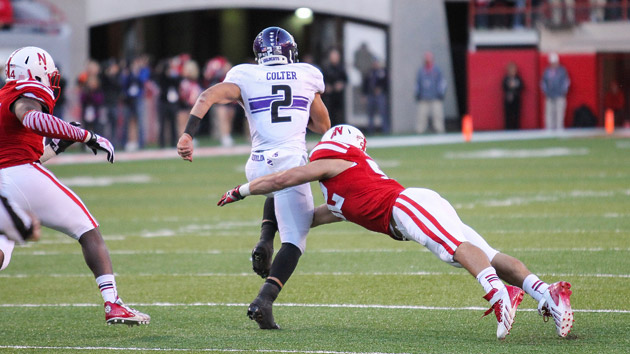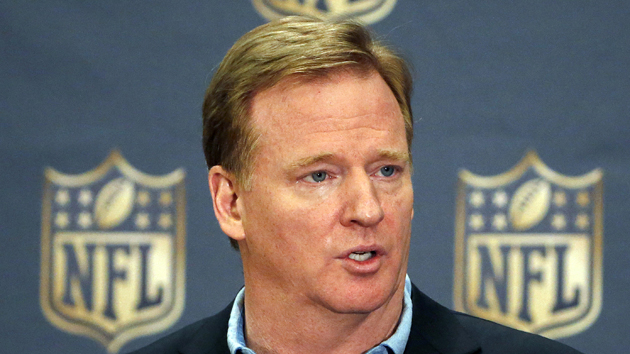
A DraftKings employee in Boston walks past screens displaying the company's online system stats.Stephan Savoia/AP
Update (11/10/15): On Tuesday, the New York Times reported that state Attorney General Eric Schneiderman ordered DraftKings and FanDuel, the country’s two biggest daily fantasy sites, to cease betting operations in the state, contending that participation in daily fantasy games constituted illegal gambling under state law. “It is clear that DraftKings and FanDuel are the leaders of a massive, multibillion-dollar scheme intended to evade the law and fleece sports fans across the country,” Mr. Schneiderman said. In a statement, FanDuel responded, “This is a politician telling hundreds of thousands of New Yorkers they are not allowed to play a game they love and share with friends, family, co-workers and players across the country.”
You’ve almost certainly seen the commercials. Turn on the TV or browse the internet, and you’ll be bombarded with ads for daily fantasy football leagues that offer huge potential winnings each week of the season. But in recent days, the two largest daily fantasy sites—DraftKings and FanDuel—have been rocked by scandal. Now, the companies are facing a lawsuit, a state probe, and possible congressional hearings.
The controversy started last week, after a DraftKings employee won $350,000 in a FanDuel contest after inadvertently publishing information showing how many competitors had drafted certain players—before that information was supposed to be made public.
Earlier this week, New York Attorney General Eric Schneiderman opened an investigation into the business practices of DraftKings and FanDuel, seeking to determine whether employees at the sites won payouts based on access to internal information. In separate letters to each company obtained by the New York Times, Schneiderman demanded information on how both companies operated, their policies surrounding employee participation in fantasy games, and what access employees had to sensitive data.
And on Thursday, a class action lawsuit was filed in a federal court in New York against the two powerhouse fantasy sites, alleging that the companies “fraudulently induced” players to pay fees to participate in contests without acknowledging that employees participated in matches and had access to confidential, nonpublic information.
DraftKings CEO Jason Robins defended his company’s response to the data leak, saying in an interview with the Boston Globe that he runs a “very ethical company.”
An investigation of the daily fantasy sports industry, which gaming firm Eilers Research estimates will generate about $2.6 billion in entry fees this year alone, could disrupt the largely unregulated business. Lawmakers have called for hearings and Federal Trade Commission intervention into a world that walks the line between traditional fantasy leagues and online sports gambling.
And it all began with a mishap. Let’s start at the beginning:
What are fantasy sports, anyway? For years, fantasy leagues have captivated audiences, giving people a new way to follow their favorite professional sports. Basically, participants enter a league, draft athletes to their rosters, and compete in weekly or nightly matches against others based on their players’ statistical performances. So, for instance, it’s football season, so you get together with a few buddies and act as your own general manager—every time one of the players on your team scores a touchdown or kicks a field goal in real life, you get points in your fantasy league. In the United States, about 31 million people participate in fantasy football leagues. You often play for free, for money, or for bragging rights.
What makes daily fantasy leagues such as DraftKings and FanDuel different? Unlike the typical office pool, at DraftKings and FanDuel, participants must drop an entry fee—anywhere from 25 cents to $1,000—into contests and draft a fresh team on a nightly or weekly basis to compete against hundreds of opponents. The stakes are higher: Competitors can win as much as $2 million, depending on the size of the competition. What’s unique about daily fantasy sites is the inclusion of a “salary cap.” Participants are given a limited budget to draft a lineup of players. That means it’s important to predict which undervalued players will perform well that week.
Who’s making money off this? While participants have the chance to win millions of dollars in these competitions, the reality is you’re more likely to lose the money you’ve put in than to gain anything substantial. An analysis by the Sports Business Journal showed the disparity between the most successful competitors and the rest of the field. The top 1.3 percent of participants in the daily fantasy baseball economy accounted for 91 percent of all player profits. And while the majority of small-time players lose about $10 per month on games, a few—5 percent of the field known as the “big fish”—accounted for 75 percent of the losses. “Hence, the DFS economy depends heavily on retaining the big fish,” Ed Miller and Daniel Singer wrote.
Eilers Research partner Adam Krejcik told Bloomberg in September that DraftKings and FanDuel would bring in a combined $60 million in entry fees in the first week of the NFL season, compared with the $30 million the sports bookies in Las Vegas would handle. At the same time, the two companies, which are each valued at more than $1 billion, hauled in a combined total of nearly $800 million in funding from investors. Those investors included New England Patriots owner Robert Kraft, Dallas Cowboys owner Jerry Jones, Fox Sports, Comcast/NBC, Major League Baseball, and the National Basketball Association, among others.
This summer, Disney (which owns the majority of ESPN) pulled out of a potential $250 million investment deal with DraftKings. But ESPN subsequently reached an advertising agreement with DraftKings, making it the network’s exclusive fantasy partner. After the scandal came to light, ESPN partially distanced itself from the company, and Outside the Lines host Bob Ley announced the network would stop airing segments sponsored by DraftKings on its original programming. ESPN told media outlets such as Deadspin and CNN Money that it would be evaluating how it incorporates DraftKings into its programming “on a day-to-day basis.” ?
Okay, so what’s the current controversy all about? The scandal surfaced after Chris Grove, editor of LegalSportsReport.com, reported that Ethan Haskell, a content manager at DraftKings, had inadvertently released lineup data for his employer’s most popular contest—the Millionaire Maker—before it was supposed to go public but after games had started at FanDuel.
Before the scandal hit, employees at FanDuel and DraftKings were barred from competing in their own companies’ events, but they were still allowed to compete elsewhere. So when Haskell came in second place in a $1 million FanDuel competition and raked in $350,000, eyebrows were raised. Questions swirled about employees’ access to data that can be used to gain a competitive advantage—in this case, information about the percentage of participants who drafted certain players.
No evidence has surfaced suggesting that Haskel actually used that information to gain an advantage. In a statement on Tuesday, DraftKings said that after a “thorough investigation,” the fantasy site found “this employee could not have used the information in question to make decisions about his FanDuel lineup” because he did not see the data until after all FanDuel lineups were finalized.
“This clearly demonstrates that this employee could not possibly have used the information in question to make decisions about his FanDuel lineup,” DraftKings stated. “Again, there is no evidence that any information was used to create an unfair advantage and any insinuations to the contrary are factually incorrect.”
A FanDuel spokesperson told ESPN that 0.3 percent of its prize money had been won by DraftKings employees—though that still amounts to at least $6 million. Both companies have now banned their employees from participating in any daily fantasy events for money. DraftKings enlisted former US Attorney John Pappalardo to conduct an internal investigation, and FanDuel has asked former US Attorney General Michael Mukasey to “review the facts and evaluate our internal controls, standards, and practices,” according to a company statement.
How exactly could nonpublic information skew the results? In daily fantasy sports, data is crucial. Participants make roster decisions based largely on which players are doing well at that point in the season and how much value they are likely to offer at their going “salary.” The complaint in the lawsuit against DraftKings and FanDuel explains why it would be so valuable to know how often each player is drafted: “Because the goal is to beat the other players, a player with statistical data about ownership percentages of competitors would have an edge over players without this data in many ways, including the ability to make rosters with enough players different from competitors’ rosters.?”
While DraftKings says it found no evidence indicating the employee in question used that information to his advantage, the lawsuit suggests that employees’ ability to access such information and the company’s awareness that employees participated in these outside competitions constitutes wrongdoing. DraftKings and FanDuel declined to comment on the lawsuit.
What are the legal implications of all this? Marc Edelman, an associate professor of law at the City College of New York, told Mother Jones that while the most recent scandal doesn’t necessarily reflect “insider trading,” it lifts the curtain on the “lack of institutional walls in place” on online fantasy groups. Sports legal expert Michael McCann wrote on SI.com that if the companies “knowingly” failed to prevent their employees from making money off their access to nonpublic data, other users could argue that both DraftKings and FanDuel “are engaged in anti-competitive conduct that violates antitrust law.”
It’s no surprise then that an investigation is under way in New York, which has one of the stronger consumer protection laws in the country. McCann noted that the Federal Trade Commission could also dive into the case and explore “whether insider knowledge in the DFS industry poses an anticompetitive, consumer-harmful practice in violation of federal trade regulations.” Massachusetts Attorney General Maura Healey has said she will not pursue an investigation into DraftKings, which is headquarted in Boston. Healey noted that no federal or state law prevents the company from operating.
The lead plaintiff in the lawsuit, a Kentucky-based fantasy player named Adam Johnson, argues that DraftKings breached its duties by “failing to prevent persons with inside information and data by virtue of their employment at other DFS sites from competing” against other players. The complaint alleges that DraftKings also “willfully failed to disclose” that employees with access to nonpublic information could compete at other sites, causing financial damage to players. The lawsuit alleges that by letting employees at both sites play in competitors’ contests, both companies “committed negligence and/or fraud.”
Why isn’t this considered sports gambling? In 2006, Congress passed legislation that outlawed online gambling. Fantasy sports, however, were left in the clear and exempted from the law. Lawmakers were apparently persuaded by an intense lobbying campaign from the professional sports industry, which argued that success in fantasy sports requires skill, not chance. As a result, it’s legal and largely unregulated.
What’s going to happen now? Lawmakers may now reconsider whether fantasy sites should be regulated. New Jersey Rep. Frank Pallone Jr. (D) recently made the argument that the rise in popularity of daily fantasy sites supports the case for the legalization of sports gambling nationwide. He and Sen. Bob Menendez, (D-N.J.) wrote a letter to FTC director Edith Ramirez asking whether the commission could regulate and set for rules the industry.
“Like professional sports betting, fantasy sports should be legal, but both are currently operating in the shadows,” Pallone said in a statement.
Other lawmakers have joined the fray. Senate Minority Leader Harry Reid (D-Nev.), who once oversaw the Nevada Gaming Commission, told the Huffington Post that Congress should scrutinize the fantasy sports industry in light of its “scandalous conduct.” And Rep. Hakeem Jeffries (D-N.Y.) requested that the House Judiciary Committee hold a hearing to examine whether the multibillion-dollar industry should be allowed to police itself.
The New York Times and the Boston Globe have penned editorials calling for regulation. Fantasy enthusiasts are calling for changes, too: Cory Albertson, who, along with his playing partner Ray Coburn, has won millions from fantasy sports, declared in an op-ed in the Wall Street Journal, “Let’s cut to the chase here: Playing daily-fantasy sports games for money is gambling. And it should be regulated.?”















